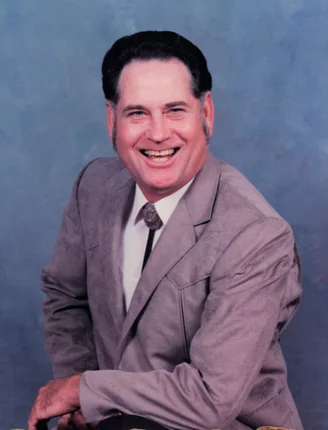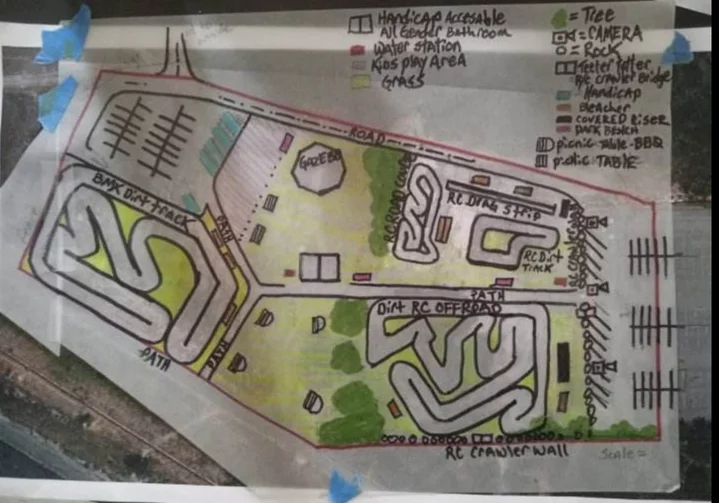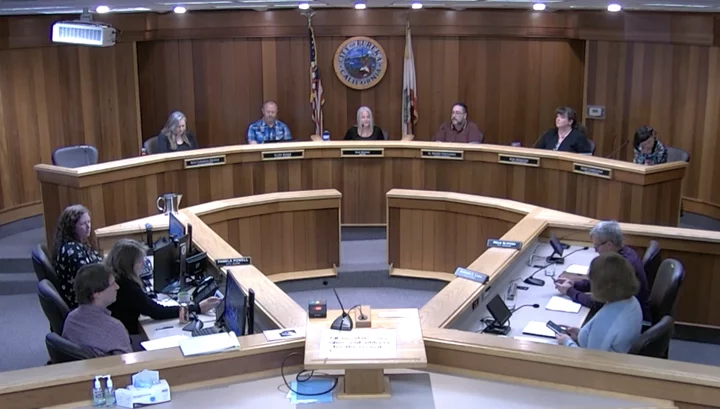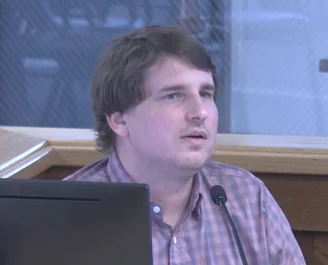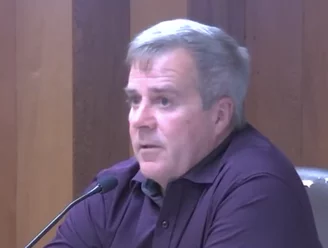OBITUARY: Herbert Orvis (Tex) Box, 1934-2023
LoCO Staff / Friday, June 2, 2023 @ 6:56 a.m. / Obits
Dad went to be with the lord on May 23, 2023. Dad passed peacefully in his sleep and is now free of pain and joyfully reunited with our mom, Arlene and other family members.
Dad was born in Lockney, Texas on January 3, 1934 to Paul and Edith Box. Paul and Edith had four children, Tex being the only son.
In 1945 the family relocated to Korbel. At past family gatherings many fond memories were shared of the years spent in Korbel.
Dad attended grammar school in Korbel and was a 1951 graduate of Arcata High School. Dad lettered in multiple sports while attending Arcata High.
In 1951 at the young age of 16 and 17 Mom and Dad were married and spent the next 60 years together until Mom’s passing in 2012. In 1952 their first son (Bobby) was born, followed by two daughters (Mona and Cindy). Two more sons (Monte and Lonnie) completed the family.
Dad worked for Simpson Timber Co. at the Korbel mill for 33 years until his retirement as production scheduler in 1984.
Dad was an avid hunter and a skilled athlete, playing on and coaching for many Blue Lake teams over the years. His hunting skills cans be attested to by the many deer racks displayed on the walls and in the patio of his home. These skills and traits he passed on to his sons and grandsons.
Dad is survived by his children Bobby (Marie) Box of Mckinlleyville, Mona Hill of Cottonwood, Cindy Box of Blue Lake, Monte (Teresa) Box of Fortuna, Lonnie (Linda) Box of Arcata and Greg Perry of Hoopa. Dad is also survived by sisters Greta Box and Martha Taylor; grandchildren Heidi and Terrence Box, Clayton and Tory Swift, David Duran, Travis Toledo, Lindsey Toledo Titus, Sarah Purvis, Casey and Cody Box; 24 great-grandchildren and one great-great-grandson.
Dad was laid to rest along side our mom, Arlene, at Sunset Memorial Park on Thursday June 1, 2023.
Burial arrangements were handled by Paul’s Funeral Chapel.
The family would like to thank everyone for prayers and well wishes.
###
The obituary above was submitted on behalf of Herbert Box’s loved ones. The Lost Coast Outpost runs obituaries of Humboldt County residents at no charge. See guidelines here. Email news@lostcoastoutpost.com.
BOOKED
Today: 8 felonies, 3 misdemeanors, 0 infractions
JUDGED
Humboldt County Superior Court Calendar: Today
CHP REPORTS
No current incidents
ELSEWHERE
RHBB: Two Mountain Lion Cubs Spotted in Fortuna Area
Governor’s Office: Governor Newsom announces appointments 2.11.26
Governor’s Office: Governor Newsom announces permanent closure of AllenCo oil wells, ending years of community harm
Mad River Union: Celebrate creativity, scholarship & storytelling at Cal Poly Humboldt
HUMBOLDT TODAY with John Kennedy O’Connor | June 1, 2023
LoCO Staff / Thursday, June 1, 2023 @ 4:20 p.m. / Humboldt Today
NEWS: The details of Eureka’s new draft budget for 2023-2024, grumbling about Gav’s state of the state roadshow, bucks for Hoopa Valley climate change adaptation, Redwood Coast Energy Authority honored, local person honored as a Changemaker, new wrestling program at CR, World Oceans day at the Trinidad Rancheria … and more!
Press play above, and stick around for the poll below!
VROOM VROOM! This RC Car Nerd is Working With the City of Eureka to Build an Outdoor Off-Road RC Track
Stephanie McGeary / Thursday, June 1, 2023 @ 12:57 p.m. / Event , Our Culture
Meet Andrew Howard, Eurekan, father, RC car guy | Photos/video: Stephanie McGeary
###
Andrew Howard, a 35-year-old lifelong Eureka resident, has been interested in cars almost his entire life. Growing up with a car enthusiast father, Howard started learning about classic cars at a young age, and was working on his first car – a ‘73 Plymouth duster – by the time he was 12 years old.
As an adult, Howard still collects and works on muscle cars from the ‘60s and ‘70s, but has also developed an interest in much smaller vehicles – radio controlled (RC) cars. Now his hobby has turned into a passion project and the City of Eureka is working with Howard and some other RC enthusiasts to build an outdoor RC racing track in Eureka.
“[I’ve] been working with the city for a little over a year to get something going,” Howard told the Outpost during an interview at Halvorsen park on Wednesday. “The city is scouting locations … . It would be really nice to see an area that’s rundown become something that’s really nice.”
Howard said that his love for RC cars really grew during the onset of COVID-19. Like many folks, Howard was looking for an outdoor activity that was safe to do during the pandemic. He took up the hobby with his son, who is now 11, and found it was a great way to get outside and have some fun during lockdown. He started with a couple of cars and now has a collection of around 60 RC vehicles ranging in size and abilities.
Eventually Howard started thinking that there must be others in Humboldt who share his passion for piloting tiny cars, so he started the Facebook group 707 Humboldt R/C Vehicles, which now has 380 members. Howard started connecting with other RC hobbyists and holding group meetups in outdoor spaces to drive and race their vehicles. Sometimes up to 20 people would meet at a time, Howard said.
Howard also works on RC vehicles, fixing broken ones or making modifications and improvements. As he was trying to get people out to race with him, many people said they had an old RC car, but that it had been broken for a long time and they couldn’t use it. Howard said that there is no other place locally that works on RC cars, so he started offering the service and said he has helped get around 200 cars “back on the road.”
“I’ve created a little niche,” Howard said. “Fixing them up is definitely one of the funnest parts.”
One of the places the group liked to use their cars was in a section of Sequoia Park, but after some community members complained, the City asked the RC group to stop running their cars there. Instead, city staff suggested a different solution — that they work together to find a suitable location to build an official racing track.
Because the city had also had similar complaints about BMX (bicycle motocross) and there is currently no designated off-road bike track in Eureka, staff also suggested that the RC folks combine efforts with the BMX community to design a park that would have both an outdoor RC racing track and a BMX track, and the concept for the Eureka Off-Road R/C Track was born.
The project is still in the very early planning stages, Howard said, and a location for the track has not been nailed down yet. But staff from Eureka’s Community Services Department have been working with Howard and have identified a few possible locations, including near the PALCO Marsh behind the Bayshore Mall in the area previously known as Devil’s Playground.
Howard added that he is still trying to find some BMX enthusiasts to get involved with the project planning, since that is not really his area of expertise.
A sketch done by Howard of a potential park design that would include the two tracks and other amenities
The other thing that the project needs, of course, is funding. Howard said city staff is working to find grant funding for the project, but to get things off the ground, the City is hosting a fundraising event on July 9 at the Eureka Municipal Auditorium. The event will be from 10 a.m. to 4 p.m. and will feature two indoor racing tracks – one for 1/10 scale RC cars and one for 1/18 scale cars – as well as a course for RC crawlers. There will also be an RC car show, and attendees will have the opportunity to vote for their favorite car, based on its looks, style and quality. The car show can also feature RC vehicles that are a little too big to race on the tracks.
The event is free to enter, with a suggested donation, and will also feature raffles, food and drinks. All of the proceeds will go toward funding the Eureka Off-Road R/C Track project. Howard wanted to mention that he is still looking for donations for the raffles and food vendors. If you would like to help out or have any questions about the event you can contact Howard at (707) 616-9188.
Howard also emphasized that this event is for anyone in the community to attend, not just RC nerds like himself. And yes, Howard is fully aware that his hobby might seem a bit nerdy. But he loves it and is completely fine with the label.
“When you’re out there having fun and you see other people seeing you and laughing at you having fun, you’re like, ‘Yeah, I look like a nerd.’ But, you know what? I’m having a good time, so it’s okay.”
just a few of Howard’s RC vehicles
Eureka Can Look Forward to a $1.4 Million Budget Surplus Balanced Budget in the Upcoming Fiscal Year, Staff Says
Isabella Vanderheiden / Thursday, June 1, 2023 @ 9:53 a.m. / Local Government
Screenshot of Tuesday’s special Eureka Council meeting.
[CORRECTION: Oops! We misinterpreted some information in the city’s budget. The City of Eureka’s general fund will not have a $1.4 million surplus in the upcoming fiscal year as originally stated. Essentially, the budget will be balanced, according to staff. The Outpost deeply regrets this error.]
###
It’s that time of the year again: Budget season!
The Eureka City Council met for a special meeting on Tuesday evening to take a look at the proposed budget for the upcoming fiscal year and review the status of the city’s major funds.
How are Eureka’s finances shaping up so far? By and large, the city is doing quite well.
“There aren’t many changes expected in the 2023-24 fiscal year in terms of the financial health of the city,” Eureka’s Finance Director Lane Millar told the Outpost. “Our sales tax revenues weren’t as good as they were last year. You know, everything went up during the pandemic but things have gone down since and kind of come back to normal. Things are looking good.”
The general fund – the city’s primary operating fund – grew by approximately $1.5 million in the current fiscal year but revenues are not expected to grow in the 2023-24 fiscal year due to increasing expenditures.
“The [general] fund has a surplus, but a much smaller surplus than the current fiscal year,” Millar said. “Overall expenditure growth is not exceptional nor unexpected due to salary increases that were approved in prior years. … Surpluses are nice to have because they add to the city’s reserves, but just having a balanced budget is also a good thing.”
The Eureka Police Department is projected to receive $16,085,838 from the general fund, up by a little over $500,000 from the current fiscal year. Similarly, the contributions to Humboldt Bay Fire, which receives about 65 percent of its funding from the city, have grown by about $200,000.
The city’s government and administration fund has increased by approximately $300,000, or seven percent, from the current fiscal year. The most notable increase in expenditures goes to the mayor’s division, which more than doubled, at 115 percent.
During Tuesday’s night’s meeting, Millar took questions from councilmembers about the budget adjustments – including about why so much more money was going to the mayor’s office.
He noted that the seemingly drastic increase “has nothing to do with any changes in the mayor’s office.” Rather, it highlights the “high costs for healthcare that the city pays.”
“When we started this fiscal year, [Mayor Kim Bergel] did not have health insurance [through the city],” Millar explained. “And now – starting in 2023-24, they took advantage of our health insurance plans and the cost of the family plan to the city is about $20,000 [annually]. So, you can see how that can really affect a small budget.”
Revenues are up for the water and wastewater funds following the adoption of the new rate study that was approved at the end of last year, Millar said. Water fund expenditures are down, largely due to “transfers,” which are monies used for capital projects. In contrast, transfers have caused wastewater fund expenditures to go up.
The harbor fund is up as well. Revenues are up due to an increase in rent and lease revenues and, overall, the fund has a pretty balanced budget, he said.
Revenues are down in the building fund due to a smaller subsidy from the general fund. Expenditures are down as well, which Millar attributed to efficiencies within the department.
“The building fund has two divisions and two departments, but the main operation is the building division within development services,” he said. “Their budget is dropping significantly. About $200,000 of [their budget comprises] two positions that [the city is] not funding in 2023-24. … We’re not eliminating positions, but we’re not funding them because we don’t anticipate filling those positions next fiscal year.”
Councilmember Kati Moulton asked Millar to elaborate. City Manager Miles Slattery jumped in and explained that the city’s new building official Brendan Reilly “has made drastic changes to that division” in the last year and a half to increase efficiencies throughout the department.
“We’ve kept those positions in place just in case we were to see an uptick or a need for those and, according to the chief building official, we do not right now,” Slattery said.
Turning back to the harbor fund, Councilmember Leslie Castellano asked if there would be funding available for improvements at the marina near the Wharfinger Building. “Folks residing at the public marina have reached out to me in the past year just about, you know, requesting improvements to the facilities and I just want to make sure that those are included in the budget,” she said.
Slattery said the city has already initiated some improvements at the public marina, but added that it has “opened up a can of worms” and is costing the city more money than anticipated.
“A lot of the issues we have with the harbor fund is that there’s a lot of long-standing leases that we’ve had that weren’t at market rate for a very long time and some of them were coming up,” he continued. “And I think that that’s an area where we can improve in order to get better market rate for some of the properties that we do have. But I can assure you that every dime that we get out of the harbor fund goes back into the harbor.”
Millar also went through funding allocations from the American Rescue Plan Act, or ARPA. The city received nearly $6.4 million in ARPA funds from the federal government during the COVID-19 pandemic and has only used $230,000 of that money to date. There are several projects planned for the remaining funds, including wastewater projects, enhanced broadband infrastructure, street reconstruction, fire station improvements and allocations to the city’s housing trust fund, among others.
After a bit of additional discussion, the council agreed to accept the report but did not take any further action on the item.
The next budget discussion on June 20 will focus on reserves, Measure H spending and city employee pensions, or CalPERS.
###
DOCUMENT: Proposed Budget for Fiscal Year 2023-24
CONVERSATIONS: There Will be a Big Town Hall Meeting on Homelessness in Eureka This Sunday, and Mayor Kim Bergel and Mental Health Clinician Jacob Rosen are Here to Tell Us About It
LoCO Staff / Thursday, June 1, 2023 @ 7:21 a.m. / Homelessness
This Sunday, the city of Eureka will hold the second of its series of Town Hall meetings on community health, and particularly on homelessness, substance abuse and mental health. These Town Hall meetings are part of Mayor Kim Bergel’s initiative to focus on those hot-button issues.
To preview this Sunday’s event — which goes under the title of “Dynamics of the Unhoused” — Bergel and City of Eureka mental health clinician Jacob Rosen recently met with the Outpost’s John Kennedy O’Connor to talk about what they hope the meeting will accomplish.
The Town Hall meeting takes place from 1 p.m. to 4:30 p.m. in Eureka City Hall – 531 K Street. More details at this link. There will be tacos!
Video above, rough transcript below.
###
O’CONNOR:
Well welcome to another Humboldt Conversation. I’m really pleased to say today we’re back with two guests that we’ve chatted with before and that’s of course Eureka mayor, Kim Bergel and Jacob Rosen. And Jacob, you work in the mental health awareness team. Remind us again what your role is and your title.
ROSEN:
So my title is managing mental health clinician, and I work for Crisis Alternative Response of Eureka.
O’CONNOR:
Now, we had a previous conversation about the work that you’ve done, and Kim, when we last chatted to you you just actually done your first workshop for mental health. But you have another one coming up this weekend which is the reason we want to come back and chat with you.
BERGEL:
That’ll be Sunday right here in council chambers. Doors open at 1, 1:30 to 4:30 is the event. There’ll be tacos and some excellent experts that you can ask questions from.
O’CONNOR:
So what is the goal from this particular workshop that’s going to be happening?
BERGEL:
So again, I would say that the goal generally is to engage the public and give them an opportunity to ask questions and be heard and answered. Because unfortunately, council, that’s something that we don’t do, which I understand why. But it’s nice to be able to have those opportunities to express your frustrations and all of those things and have those questions answered in real time.
O’CONNOR:
And Jacob, how is your department partnering with the city on this particular?
ROSEN:
So we’ve really wanted to push it, right? I mean, the idea of being able to do something like this, it also falls under the client advocacy piece. And so being able to start this conversation and make it more public and involve the community, a lot of these issues really require community buy-in to start generating solutions. And so participating in this is kind of a no-brainer for us just because it furthers so many of our goals, whether we’re talking about mental health or homelessness or substance use. We really want to engage the community in that discussion and bring everyone into the fold so that we can help people better.
O’CONNOR:
Now it is obviously very much a community focused event. Who is this actually for?
ROSEN:
The community. Absolutely, yeah. I mean, we, you know, when I came to the city and after the first council meeting that I sat in on and saw, you know, I noticed that there was a lot of passionate frustration. There was a lot of folks who very obviously care for the community and want things to be better, but maybe don’t know, you know, whether it’s where to put that energy or how to apply that energy to improve it. And so, you know, one of the things I was thinking is, well, let’s channel that. How do we kind of take this energy that is, I think, well intended and then turn it into something that can be a little more functional? And I think that, you know, starting that dialogue is the first step, right? If we’re not communicating, we’re not able to talk about solutions. We’re not able to talk about how to apply this. And so that was really kind of the idea behind let’s create that forum and use the setting to engage the community better.
BERGEL:
I would say too, I think it’s an opportunity to dispel some of the myths that are out there about specific populations or specific issues. As I said, we have a panel of experts. We have Jacob here. And so that really opens the doors for positive communication, respectful dialogue.
O’CONNOR:
And as you’ve said, it is very much for the community, so you don’t need to be homeless, you don’t need to be perhaps in any kind of distress or…
BERGEL:
You’re welcome. If you don’t love Eureka, you’re welcome. We just love to see you and engage with you. Absolutely.
O’CONNOR:
This is the second forum, the second workshop. Is it going to be different from the first or is it somebody who attended the first and there’s a reason for them to attend the second?
BERGEL:
Oh yes, the topic is completely different and still the same. Just a different focus. Would you like to speak to that as well? Yeah.
ROSEN:
So the topic this time, we’re calling it dynamics of the unhoused. And the reason we went with dynamics in particular, we wanted to focus in on the idea that for folks who experience homelessness, there’s medical issues, there’s mental health issues, there’s substance use issues, there’s issues accessing social services, where, you know, they can get more support to get out of that state of homelessness. And so we really wanted to kind of cover the gamut. The first one, we really covered mental health specifically and kind of like, what is mental health and how do we talk about this? And, you know, that is a piece of this next discussion. And yet this, I think, is kind of zooming out a little bit more and focusing on kind of all the pieces that go into that.
O’CONNOR:
Great. And Kim, of course this is something that’s very very much a passion of yours, it’s something you really wanted to take on as Mayor. Are you seeing any sort of changes, any shift in attitude or even in the community since you’ve been really pushing this?
BERGEL:
Well, I am hopeful. I have had people reach out to me on both sides of the of the issue. And so again, I think it’s just important to keep having these conversations because you know Rome wasn’t built in a day, right? Things aren’t going to change overnight. But if we continue, continue to have these conversations, my hope is that we’ll be able to shift some of the the narrative and really start looking at how we as a community can work together. Because we know this, that community problems, we need community solutions. We need people engaged. We need people’s opinions. We need people’s solutions. And we need to know where they’re at, you know, with their frustrations, so that we can build these relationships that are so important for a healthy community.
O’CONNOR:
Now, I agree entirely and I think it’s very important that we at Lost Coast as well are supporting you in this as well, because we we see some negativity … people say well they you know people should help themselves it’s not up to the city I disagree with that fundamentally and I assume you do you both do too. It needs to be…
BERGEL:
Yeah, I think it’s both and, you know, but I do think that, you know, when people are willing, they’ll get the help that they need. And as a community, we do all need to be educated and understand some of the things that are happening, you know, from an expert’s perspective instead of from, you know, this brief or this very narrow view that we see from where we sit.
O’CONNOR:
Okay, so remind us again, the date, time, place? Thanks.
BERGEL:
Time, the date.
ROSEN:
Sunday, June 4th from 1 to 4.30.
O’CONNOR:
And you’ve got a panel of experts as well. And of course, you’ll both be here. And there’s tacos.
BERGEL:
Tacos! And then NAMI and Hope Center again will be tabling. Yep. So there’ll be good information there too for people that want to engage in that regard.
O’CONNOR:
Well Mayor Kim, Jacob, great to see you both again. Thank you so much for sharing a Humboldt Conversation with us today. Thank you so much for having us. And thank you for joining us for a Humboldt Conversation. We’ll hopefully see you all the next time. Until then, bye bye. Thank you.
How Much More Gavin Newsom’s Tour Cost Taxpayers
Sameea Kamal / Thursday, June 1, 2023 @ 7 a.m. / Sacramento
Gov. Gavin Newsom speaks at San Quentin State Prison announcing that the facility will be transformed to focus on training and rehabilitation on March 17, 2023. Photo by Martin do Nascimento, CalMatters
Gov. Gavin Newsom’s State of the State tour to jump start his second term cost taxpayers at least five times more than the traditional prepared speech that launched his first, according to records obtained by CalMatters.
That’s the price of California’s governor seeking a new approach to push his agenda — a high-profile, highly-choreographed four-day journey that spanned the state, each day focusing on one policy area.
“We’re just trying to do something to generate a little more energy so people understand what our priorities are,” he said on the fourth and final day of his March tour, which started in Sacramento, proceeded to the Bay Area and Los Angeles County and ended in San Diego.
Newsom’s February 2019 speech to a joint session of the Legislature in Sacramento cost taxpayers a little less than $7,000, mostly travel expenses for two consultants and teleprompter services.
The 2023 tour cost at least $38,000, according to receipts obtained through public records requests. The receipts include flights, hotel and transportation expenses for the governor and his staff.
Newsom’s office pushed back, saying the comparison between the traditional speech and the tour was “not apples to apples.”
“Not a lot of people pay attention to what’s happening in Sacramento on a daily basis,” Anthony York, spokesperson for the governor, told CalMatters on Tuesday. “A 30-minute speech in Sacramento, it’s over. And I think it adds to the disconnect between people and their government.”
“It’s important for any politician — whether that’s the Legislature, the governor or the president — to be out among their constituents to be talking about what their government is doing,” York added.
The governor’s office, which paid all the costs, did not provide an estimated budget for the high-profile tour.
But the total bill could be higher.
The receipts provided by the governor’s office don’t include security costs, which are paid for by the California Highway Patrol. CalMatters asked for those costs, but they were not available for this story.
The governor’s office said some of the travel costs in the receipts were not for the tour specifically because “other official business required some staff involved in the tour to extend their trip to join other events or meetings.” Large portions of some documents were redacted, to protect “personal privacy,” the governor’s office said.
Tracking the spending for the internal operations of the governor’s office can be difficult — because many expenses are offloaded to other departments, said Jon Coupal, president of the Howard Jarvis Taxpayers Association.
It’s also complicated to parse out expenses necessary for the governor to do his job from the political events, Coupal said.
One example: “If he flies down to the Central Valley to look at the Tulare Lake flooding, that’s legitimate. But is he gonna make some campaign stops in the lake? Probably … It’s very, very difficult to break down.”
The association tracks, and has sued, over outright political advocacy paid through the state budget, Coupal said, critiquing Gov. Jerry Brown for campaigning for Proposition 30, a 2012 ballot measure to increase the statewide sales tax rate.
The Newsom tour locations spotlighted different programs in which he wants to invest more state money to make progress on complex problems.
At Cal Expo in Sacramento, he toured tiny homes, another of his strategies to help people experiencing homelessness — which he called a “disgrace” and put at the top of his agenda in his 2020 State of the State speech. At San Quentin State Prison, he unveiled a plan to “transform” education and skills training for inmates as part of his prison reform efforts.
At a Kaiser Permanente warehouse in Downey, he launched the state’s low-cost insulin program, a significant step in his goal to lower prescription prices, and disclosed that he wants the state to make its own naloxone, used to save people from fentanyl overdoses. And at a hospital in San Diego, he discussed expanding behavioral health programs and proposed a $3 billion bond measure in 2024 to expand psychiatric treatment centers.
At each stop, state administrators, advocates and state and local elected officials flanked the governor.
The events, which drew widespread media coverage, went far beyond what was required of Newsom. The governor’s only obligation, according to California’s Constitution, is to submit a letter to the Legislature — which he did three days after the tour ended.
While the tour promoted Newsom’s efforts as the state’s chief executive to tackle some of California’s most pressing problems, the attention also didn’t hurt any future political ambitions.
He insists he’s not running for president and he’s enthusiastically backing President Biden’s 2024 reelection, but the governor is still amping up his national presence. Less than two weeks after the tour, Newsom launched a new Campaign for Democracy and jetted off to three Southern GOP states to meet with Democrats — a trip paid for by his newly formed political action committee, seeded with $10 million in leftover money from his 2022 campaign.
###
CalMatters.org is a nonprofit, nonpartisan media venture explaining California policies and politics.
California Bill Aims to Rein in High Security Deposits
Alejandra Reyes-Velarde / Thursday, June 1, 2023 @ 7 a.m. / Sacramento
A for rent sign in Sacramento on June 28, 2022. Photo by Miguel Gutierrez Jr., CalMatters
Most renters know securing housing isn’t as simple as finding the perfect place.
California’s renters must save up thousands of dollars to provide security deposits that can legally be as much as two months’ rent, or three months’ for furnished units.
Add in the requirement that renters put up the first month’s rent before they can move in and low-income families are most likely to give up hope of finding a home.
The state Assembly on May 22 passed a proposal that could change that.
Assembly Bill 12 would limit security deposits to one month’s rent, regardless of whether a unit is furnished or not. If the bill passes and gets Gov. Gavin Newsom’s signature, California could become the 12th state to limit security deposits.
“Security deposits present barriers for people to move into apartments, which can lead them to stay in apartments (and) in homes that are too small, crowded or even unsafe,” said Matt Haney, the Democratic Assemblymember from San Francisco who authored the bill. “In other cases, people take on debt or financial burden that leaves them unable to afford other necessities.”
Haney said the bill has attracted widespread support in the Assembly, including from lawmakers who are landlords as well as labor organizations representing teachers, nurses and grocery store workers.
Assemblymember Diane Dixon, a Republican from Newport Beach, was among the Nos in the 53-14 vote. She cited concern about the bill’s potential to reduce the housing supply.
“The more we over-regulate people’s ability to offer a successful product, the scarcer it will become,” she said in a statement. “Landlords charge security deposits to cover potential damages and any unused funds are returned to the renter.”
Like a downpayment
Haney said the issue caught his attention when a janitor in his district described living with his wife and three children in a one-bedroom apartment.
“He wanted to move into a larger unit so his kids didn’t have to sleep in the same room as him and his wife,” Haney said. “He said he could afford the rent, but he couldn’t afford the deposit and first month’s rent to move in. Unfortunately that’s not an uncommon situation.”
In California, the median rent for a two-bedroom apartment is $2,538 and for a three-bedroom home is $3,795 according to Zillow. For a $3,000-a-month unfurnished unit, a landlord can charge as much as $9,000 for a security deposit and the first month’s rent.
“People are being asked to pay the equivalent of the down payment of a home in many parts of the country just to move in,” Haney said. “It’s really untenable.”
Tina Rosales, housing attorney and policy advocate with the Western Center on Law & Poverty, said the bill could help fight homelessness.
She came across a San Francisco apartment that called for $10,000 up front, including a security deposit, first month’s rent and fees.
“That’s a lot of money for anybody,” she said, “but especially for low-wage workers, and particularly for Black, Latin and indigenous households. No one can afford market rate housing, plus first, last and two months of security deposits, on top of other excessive fees landlords are permitted to charge.”
Alternatives to security deposits
Debra Carlton, spokesperson for the California Apartment Association, said the landlord group is disappointed that Haney did not consider alternatives.
“The vote on the bill came earlier than we thought, and we had hoped that he would work with us to find perhaps a different solution, but obviously that didn’t happen,” she said.
Carlton said security deposits are important because they allow landlords to pay to repair damage to units. And, should an eviction be necessary, deposits help landlords cover those costs. The average court eviction can take as long as six months and cost an average of $10,000, the association said.
Carlton suggested tenants participate in insurance or bond programs, which could help cover potential damages, like security deposits.
“People are being asked to pay the equivalent of the down payment of a home in many parts of the country just to move in.”
— Matt Haney, Democratic Assemblymember from San Francisco
She added that the bill could force landlords to increase rents and become stricter when vetting tenants, ultimately making it harder for tenants to find housing.
Haney said his staff met with the California Apartment Association and he is open to talking with them, but he believes the limits are necessary.
He said he would consider amending the bill to exempt homeowners who rent out a single room or a guest house.
###
CalMatters.org is a nonprofit, nonpartisan media venture explaining California policies and politics.

